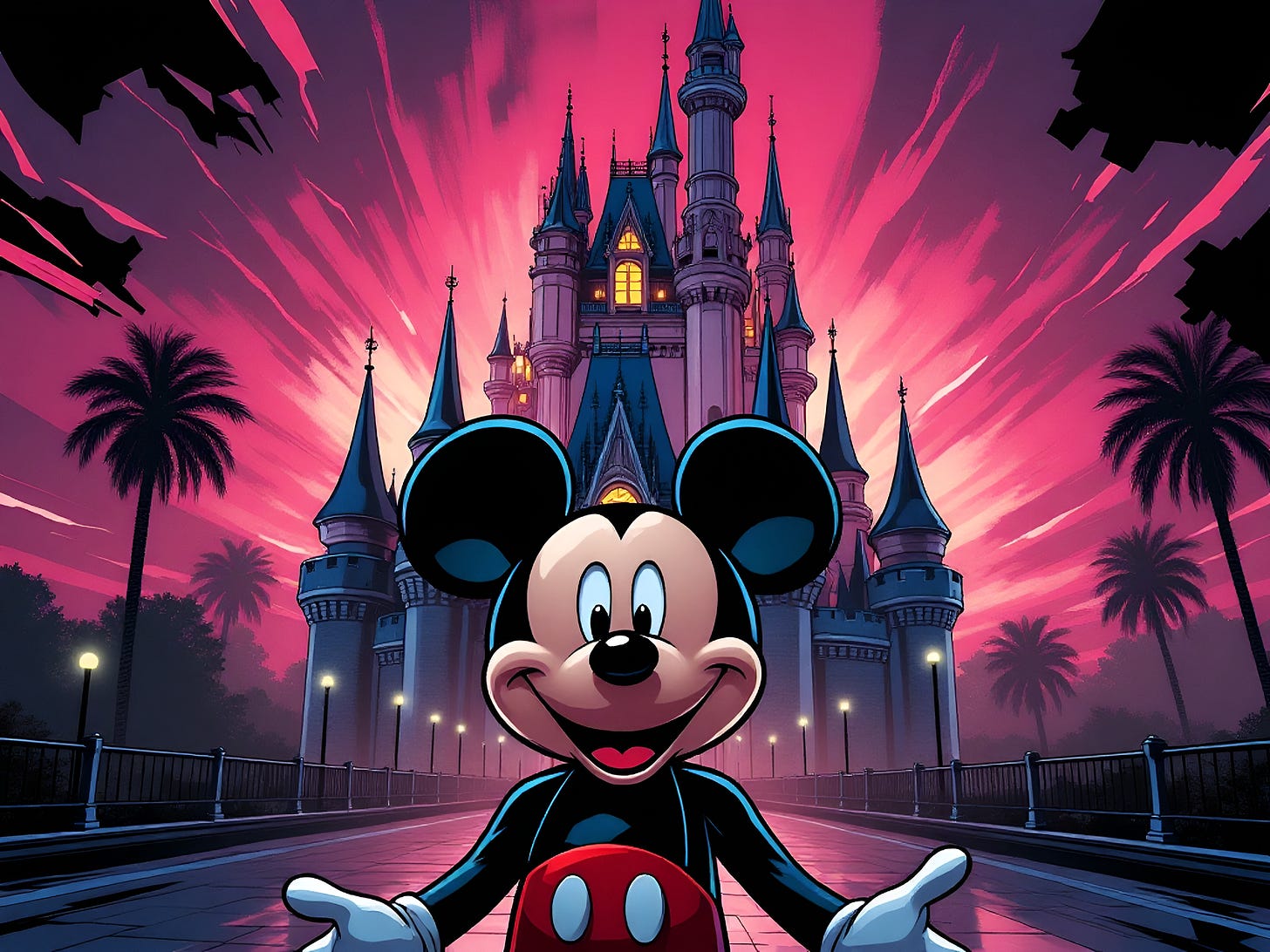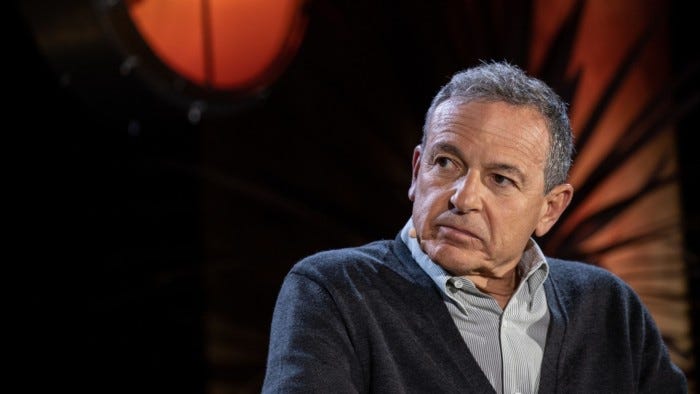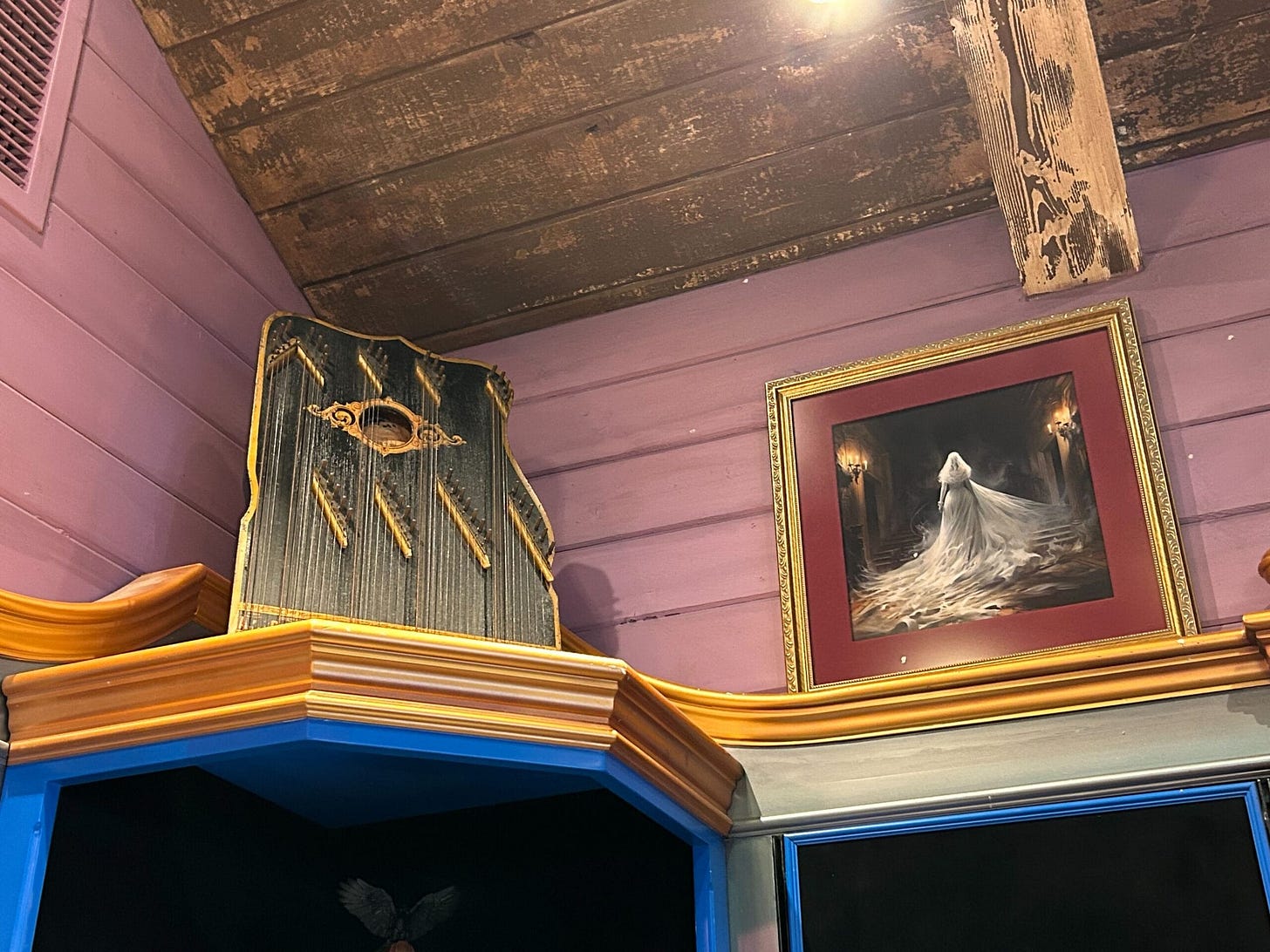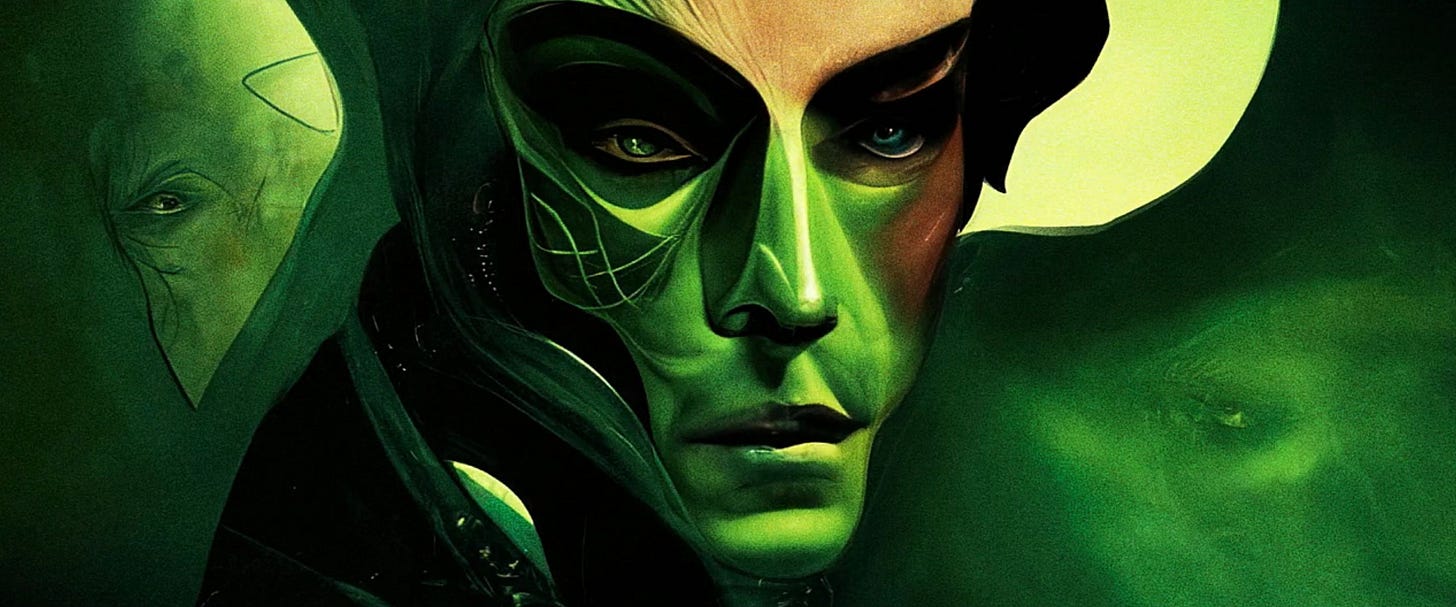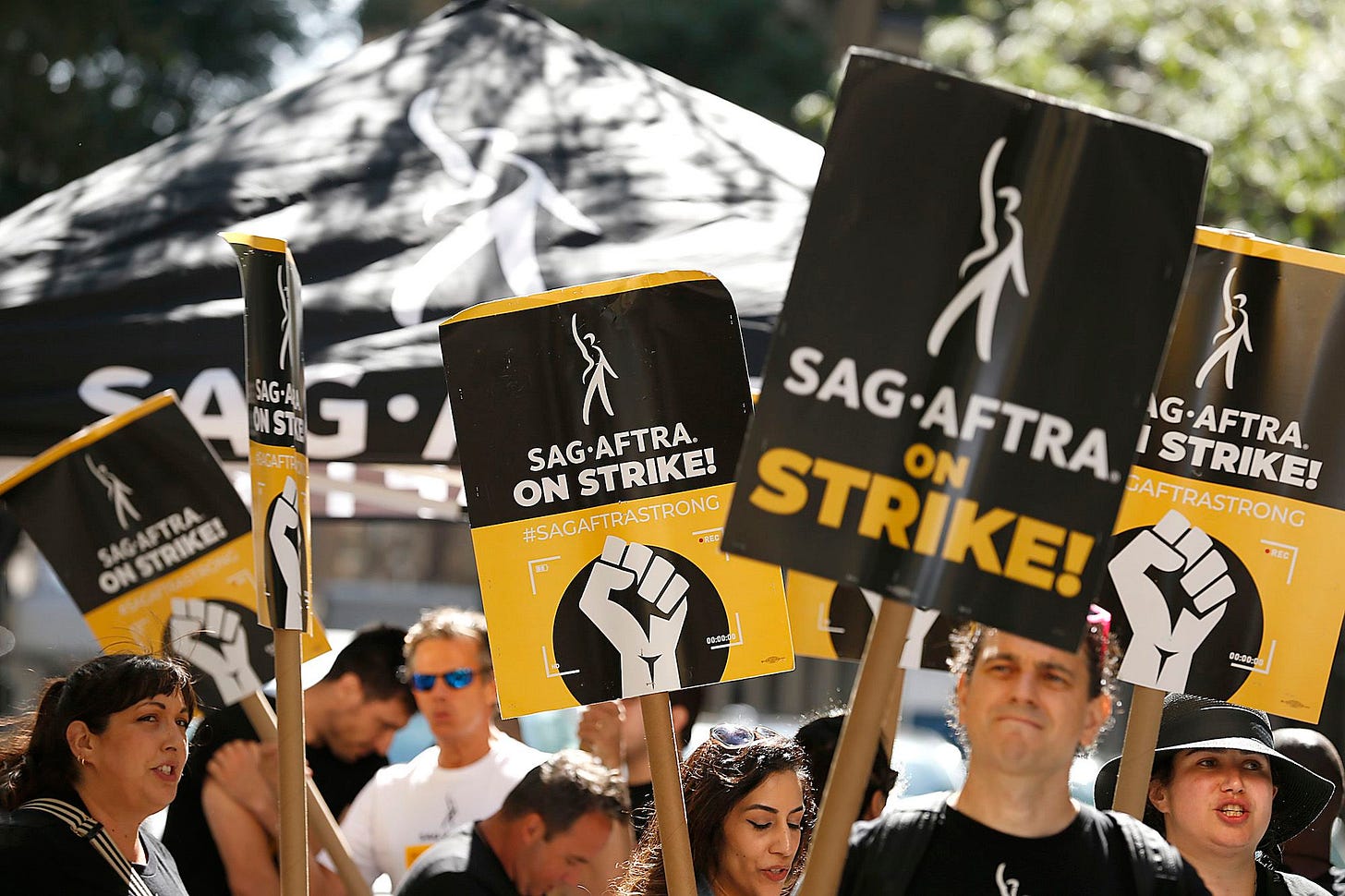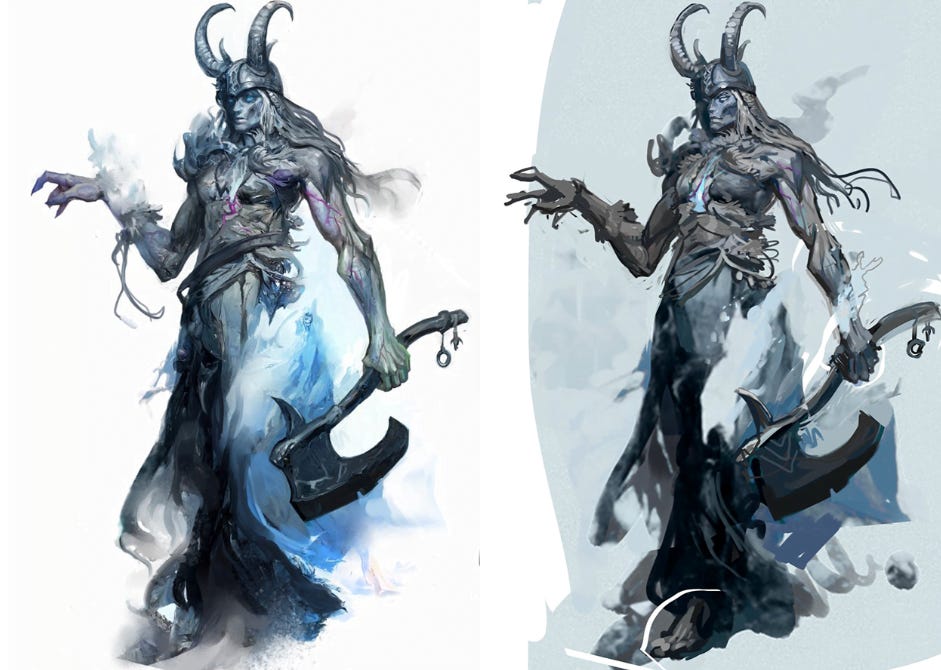Disney is Going All-in on AI, and They Don’t Care That Artists Hate It.
Disney has long been a trailblazer, from pioneering animated features to dominating the streaming wars. But now, the House of Mouse is charging headfirst into artificial intelligence, deploying it across everything from theme parks and advertising to filmmaking and content creation.
Despite vocal outcry from artists who fear job losses and creative theft, Disney's leadership, including CEO Bob Iger, views AI as an unstoppable force multiplier. As the company ramps up its AI initiatives in 2025, the tension between innovation and artistic integrity is reaching a boiling point.
Here's the TLDR...
Disney is integrating AI into nearly every facet of its operations, from personalized ads and theme park experiences to production tools, despite ongoing lawsuits against AI companies for IP theft.
Artists are pushing back hard, citing examples like AI-generated posters that sparked backlash and forced removals, arguing it devalues human creativity.
The rapid industry-wide adoption of AI makes avoidance nearly impossible, especially amid Hollywood's economic woes like layoffs and slumping box office numbers.
Ironically, the 2023 strikes that secured AI protections for writers and actors may accelerate AI use as studios cut costs during downturns.
Other studios like Hasbro, DreamWorks, and Japanese anime houses are also embracing AI, signaling a broader shift.
Ultimately, AI isn't going away—it's the next evolution, much like the shift from 2D to 3D animation, but it'll always require human oversight to thrive.
Disney's Aggressive AI Push: News, Quotes, and Bold Moves
Disney isn't dipping its toes into AI; it's diving in with both feet. In early 2025, the company showcased AI-powered advertising innovations at CES, using machine learning to deliver hyper-personalized ads across its platforms. This builds on a broader strategy where AI is already embedded in operations, from enhancing theme park guest experiences—like predictive crowd management and customized interactions—to streamlining content production.
CEO Bob Iger has been vocal about AI's potential, calling it "an enormously powerful technology" that Disney is beginning to utilize across the board. In a March 2025 interview, Iger described AI as potentially the "most powerful technology that our company has ever seen," emphasizing its role in boosting creativity rather than replacing it. By August, he reiterated that AI would "over time, become an important component of how our company operates," highlighting its use in everything from data analysis to operational efficiency.
Recent developments underscore this commitment. Disney joined forces with tech giants like Nvidia, adopting RTX Pro Servers for AI infrastructure to accelerate design, simulation, and content creation. The 2025 Disney Accelerator program selected AI-focused startups, aiming to pioneer advancements in mixed reality and immersive storytelling. Additionally, Disney established a dedicated group to oversee responsible AI and mixed reality adoption company-wide, signaling a structured approach to integration.
Yet, this enthusiasm comes with caveats. Disney, alongside Universal, filed a landmark lawsuit in June 2025 against AI image generator Midjourney, accusing it of copyright infringement by training on their intellectual property. This dual stance—suing external AI firms while internally expanding AI use—highlights Disney's desire to control the technology on its terms.
Artists' Backlash: A Growing Chorus of Concern
While Disney touts AI as a boon, artists see it as an existential threat. Backlash has been swift and fierce, particularly over instances where AI appeared in promotional materials. In June 2025, fans spotted alleged AI-generated artwork in posters for Disneyland's Oogie Boogie Bash, criticizing distorted hand proportions and unnatural elements as hallmarks of machine-made art. Disney faced similar scrutiny in January 2025 when AI art in the Haunted Mansion gift shop drew ire, leading to its quiet removal amid public outcry.
Broader artist communities, including those on social platforms like X (formerly Twitter), have amplified these concerns. Posts from creators highlight fears of job displacement and ethical issues, with one artist noting, "AI is to be used with criterion, not to steal other people's work," in response to Disney's trends. Reports from outlets like Creative Bloq detail how Disney scrapped multiple AI projects for films like 'Moana' and 'Tron' due to legal risks and anticipated public backlash.
This resistance echoes wider industry sentiments, where animators and illustrators argue AI undermines the human essence of art. As one social media user put it in a discussion about Disney's AI task force, "This comes after Disney owned Marvel Studios created an AI intro for Secret Invasion which was met with an obvious backlash from surrounding artists."
The Inevitable Tide: Why Avoiding AI is Getting Tougher
AI's adoption is happening at a blistering pace, making it increasingly difficult for artists and studios to sidestep. Projections show AI hardware spending hitting $3–4 trillion by 2030, with companies like Disney, Hyundai, and TSMC leading the charge. In animation alone, tools are automating tasks like background generation and in-betweening, slashing production times from weeks to hours.
This rapid integration is amplified by Hollywood's economic pressures. The industry is grappling with a downward trend—box office slumps, streaming fatigue, and massive layoffs. A 2024 report predicted 21% of film, TV, and animation jobs could be consolidated or eliminated by AI within years. Animation studios are downsizing U.S. operations, outsourcing to lower-cost regions outside LA, and leaning on AI to cut expenses. Videos and analyses from industry insiders describe the U.S. animation sector as "collapsing," with AI and outsourcing as key culprits.
The Irony of the Strikes: Protections That Might Backfire
The 2023 Hollywood strikes by the Writers Guild of America (WGA) and SAG-AFTRA were landmark battles for AI safeguards. Writers secured the first-ever contract clauses restricting AI use in scripts, while actors gained protections against unauthorized digital replicas. These victories were hailed as blueprints for worker-led AI governance.
But here's the irony: The strikes' emphasis on protections may inadvertently hasten AI adoption. With Hollywood facing a post-strike hangover—lingering production delays, economic uncertainty, and a "downward trend" in revenues—studios like Disney are turning to AI for cost savings. Speculatively, this could mean more automation to offset higher wages and residuals from the deals, turning the strikes' wins into accelerators for the very tech they fought against. As one analysis notes, the strikes stopped AI from taking jobs immediately, but sustaining that in a slumping market is another story.
Other Studios Jumping on the AI Bandwagon
Disney isn't alone; several studios have publicly embraced AI, with verified statements underscoring its role in animation.
Hasbro: CEO Chris Cocks confirmed the company is already using AI in games like Dungeons & Dragons, stating it's "mostly machine-learning-based AI" and expressing excitement about deploying it "significantly and liberally." He noted friends using AI for D&D campaigns as a "clear signal" to embrace it, though Hasbro previously forbade illustrators from using AI-generated artwork.
DreamWorks: Co-founder Jeffrey Katzenberg likened AI to the CGI revolution of the 1990s, predicting it could eliminate 90% of artist jobs in animated films within three years. He views AI as a "creative tool" that will cut production times dramatically, though the studio has included anti-AI warnings in credits for films like The Bad Guys 2 to prevent training on their content.
Anime Studios (e.g., Toei, K&K Design, Sony): Japanese studios are leading AI integration. Toei Animation plans to use AI for storyboards, coloring, and backgrounds to speed up productions amid staffing shortages. K&K Design employs customized AI for anime, reducing background work from weeks to hours. Sony, through studios like CloverWorks and A-1 Pictures, is using AI for coloring in new series, despite industry concerns. Projects like Hinahima Twins used AI for 95% of backgrounds, marking a milestone in AI-assisted anime.
People Also Ask: Quick Answers on Disney and AI
To address common queries in the spirit of SEO-friendly content:
What is Disney using AI for in 2025? From personalized theme park experiences and ad targeting to production efficiencies, AI is woven into operations, with partnerships like Nvidia accelerating adoption.
Why are artists upset about Disney's AI use? Concerns include job loss, IP theft, and devaluing human art, as seen in backlash to AI posters and scrapped projects.
Will AI replace animators at Disney? Not entirely—Disney emphasizes enhancement, but industry trends suggest significant job shifts, similar to past tech transitions.
How does Disney's AI stance compare to other studios? Like DreamWorks and Hasbro, Disney sees AI as transformative, but it's also litigating against unchecked AI use.
Is AI adoption speeding up due to Hollywood's downturn? Yes, economic pressures from strikes and market slumps are pushing studios toward cost-saving tech like AI.
Wrapping Up: AI is Here to Stay, But Humans Are the Heart
Love it or hate it, AI is embedded in entertainment's future, much like how 3D animation disrupted the industry decades ago. Back in the early 2000s, 2D animators fiercely resisted the shift to CGI, with some being retrained or sidelined as studios like Sony and Disney pivoted to 3D for hits like Shrek and Toy Story. The evolution from hand-drawn 2D sketches to digital 3D realism was met with backlash—artists feared losing traditional skills—but it ultimately expanded creative possibilities. Today, AI represents the next step in merging technology and art, automating rote tasks while freeing humans for higher-level storytelling.
That said, AI will likely always need a human component. As unions like the Animation Guild protest at events like Annecy, calling for regulations amid "emergency" levels of AI encroachment, the message is clear: Tech should augment, not replace. Disney's all-in approach may ruffle feathers, but it's a microcosm of an unstoppable wave.
Artists who adapt—like those who transitioned from 2D to 3D—will shape this new era, ensuring AI enhances rather than erodes the magic of creation.
Hat Tips
Retail Tech Innovation Hub on Disney's AI recruitment push: https://retailtechinnovationhub.com/home/2025/8/30/keith-richman-disneys-recruitment-push-shows-that-ai-implementation-is-a-people-not-a-tech-problem
CoinCentral on global AI infrastructure adoption including Disney: https://coincentral.com/global-giants-from-disney-to-hyundai-join-tsmc-in-nvidia-ai-infrastructure-push/
Nvidia Investor on industry leaders adopting RTX Pro Servers: https://investor.nvidia.com/news/press-release-details/2025/Industry-Leaders-Transform-Enterprise-Data-Centers-for-the-AI-Era-With-NVIDIA-RTX-PRO-Servers/default.aspx
HFTP on Disney's AI strategy for theme parks: https://www.hftp.org/blog/disney-ai-strategy
RCR Wireless on Disney and others adopting Nvidia AI platforms: https://www.rcrwireless.com/20250827/industry-4-0/all-in-new-nvidia-ai-platform
DigitalDefynd on ways Disney uses AI: https://digitaldefynd.com/IQ/ways-disney-use-ai/
WebProNews on Disney's cautious AI push: https://www.webpronews.com/disneys-cautious-ai-push-in-filmmaking-balancing-innovation-and-risks/
Walt Disney Company on 2025 Accelerator: https://thewaltdisneycompany.com/disney-accelerator-companies-2025/
DesignRush on Disney's AI for advertising at CES: https://news.designrush.com/disney-reveals-its-ai-developments-for-smarter-advertising-at-ces-2025
JD Supra on Disney-Universal lawsuit vs. Midjourney: https://www.jdsupra.com/legalnews/ai-news-roundup-disney-and-universal-5320779/
DEG Online on Disney's AI oversight group: https://www.degonline.org/disney-establishes-group-to-oversee-ai-mixed-reality-adoption-in-responsible-way-across-the-company-variety/
Hollywood Reporter on Iger's AI comments: https://www.hollywoodreporter.com/business/business-news/bob-iger-disney-ai-use-comments-1236169173/
Creative Bloq on Disney's AI setbacks: https://www.creativebloq.com/entertainment/movies-tv-shows/disneys-ai-setbacks-offer-some-hope-for-artists
BBC on Disney-Universal suit: https://www.bbc.com/news/articles/cg5vjqdm1ypo
Inside the Magic on Oogie Boogie Bash backlash: https://insidethemagic.net/2025/06/disney-faces-backlash-over-ai-artwork-in-oogie-boogie-bash-posters-em1/
Artnet on Midjourney's response: https://news.artnet.com/art-world/midjourney-fires-back-disney-and-universal-copyright-suit-2675798
Inverse on Disney fighting AI: https://www.inverse.com/entertainment/disney-universal-midjourney-ai-lawsuit
Time on lawsuit implications: https://time.com/7293362/disney-universal-midjourney-lawsuit-ai/
Brookings on WGA strike AI protections: https://www.brookings.edu/articles/hollywood-writers-went-on-strike-to-protect-their-livelihoods-from-generative-ai-their-remarkable-victory-matters-for-all-workers/
Guardian on Hollywood writers triumph: https://www.theguardian.com/culture/2023/oct/01/hollywood-writers-strike-artificial-intelligence
Wikipedia on SAG-AFTRA strike: https://en.wikipedia.org/wiki/2023_SAG-AFTRA_strike
Wired on strikes stopping AI: https://www.wired.com/story/hollywood-saved-your-job-from-ai-2023-will-it-last/
Screen Daily on US animation challenges: https://www.screendaily.com/features/why-outsourcing-and-ai-means-the-us-animation-sector-is-facing-hefty-challenges-in-2025/5199989.article
Cartoon Brew on animation industry collapse: https://www.cartoonbrew.com/artist-rights/an-industry-worker-explains-why-the-u-s-animation-industry-is-collapsing-241170.html
Variety on Annecy AI protest: https://variety.com/2025/film/global/animation-unions-anti-ai-protest-annecy-1236424470/
Compiled and edited by Ivy Adams for Pirates & Princesses.


